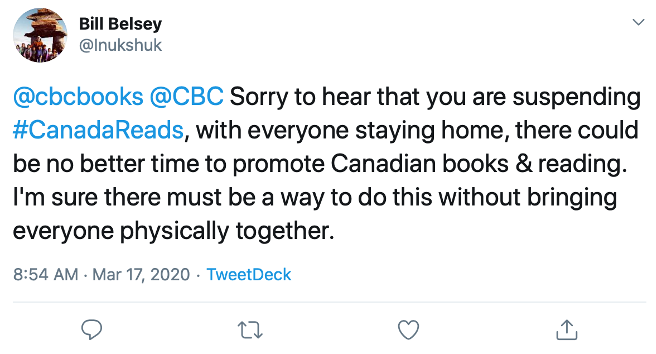“What do a tornado hunter, an actor, a fashion icon, a TV host, and a singer have in common? They’re the panellists for Canada Reads 2018” (CBC Books). With this statement, the CBC officially introduced the contenders for the 2018 season of Canada Reads. The panellists and their chosen books included: Mozhdah Jamalzadah, defending The […]
Canada Reads 2018 Headlines

“What do a tornado hunter, an actor, a fashion icon, a TV host, and a singer have in common? They’re the panellists for Canada Reads 2018” (CBC Books). With this statement, the CBC officially introduced the contenders for the 2018 season of Canada Reads. The panellists and their chosen books included:

- Mozhdah Jamalzadah, defending The Boat People by Sharon Bala
- Tahmoh Penikett, defending American War by Omar El Akkad
- Greg Johnson, defending Precious Cargo by Craig Davidson
- Jeanne Beker, defending Forgiveness by Mark Sakamoto
- Jully Black, defending The Marrow Thieves by Cherie Dimaline
But how did the media cover Canada Reads 2018? What do these stories tell us about Canada Reads? To answer these questions, we have collected and analyzed 109 articles written about the 2018 Canada Reads season. The articles fall into seven main categories:
Categories
1. Articles about the panellists: In our sample, the majority of articles (37%) were written about the panellists. The topics included: why the panellists were championing their book, how the panellists were preparing for the debate, the panellists’ thoughts on themes in the books or on the show, how the panellists got to know the authors of the books they were championing, and lists of books that inspired, influenced or guided the panellists. Other articles covered news or announcements related to Canada Reads 2018, such as “Canada Reads panelist Greg Johnson donating copies of Precious Cargo, The Marrow Thieves to 2 Saskatchewan schools,” or “Jeanne Beker, championing Forgiveness, wins Canada Reads 2018.”
2. Articles about the authors or their books: Articles about the authors or their books were the second most common, making up 33% of our collection. These articles featured the authors speaking about major themes in their novels (such as immigration and forgiveness), lists of books that shaped the authors, information on their writing practices, or what it’s like to have a book on the Canada Reads program. Articles about the books focused on how public audiences related to the novels. There were also three articles covering news or announcements, such as “Adaptation of Canada Reads 2018 Winner Forgiveness in development with CBC and DCTV” and “Toronto’s Cherie Dimaline, Catherine Hernandez are among Trillium Book Award”.
3. General articles about the program or logistics: Articles about the program or logistics made up 11% of our sample, including “how-to” articles (“How to tune into Canada Reads 2018” or “Order a Canada Reads Poster for your classroom, library, community centre or bookstore”) and program announcements (“Meet the Canada Reads 2018 Contenders” or “Canada Reads 2018: All the highlights”). One article was written about Combat des livres, the French-language equivalent to Canada Reads.
4. Articles providing suggestions for other content: A small subsection of articles (7%) were published suggesting other content for Canadians to read, watch or listen to following Canada Reads. Six articles were written suggesting what to read, watch, and listen to if you loved American War, The Boat People, Previous Cargo, The Marrow Thieves, or Forgiveness. One article suggested five books to read after Canada Reads 2018, and one article listed seven Canadian books to read on World Refugee Day.
5. Articles about the craft of writing: The CBC published five articles (4.6%) focused on the craft of writing—one with writing advice from each author. The headlines included tips like don’t throw anything out, write every day, and get off your phone.
6. Articles highlighting how Canadians engaged with Canada Reads 2018: The CBC also published five articles (4.6%) highlighting how Canadians engaged with the 2018 season. One article outlined how youth of Fredericton, N.B. hosted their own version of Canada Reads on the CBC Radio program Information Morning. Three articles focused on what Canadians (specifically, library workers in BC, the town of Sudbury, and a mayor, an English major, an actor, an educator and writer) thought about the 2018 shortlist. The fourth article highlighted how different regions across Canada engaged with Canada Reads 2018, including summaries of the previous three articles. The fifth article explored how readers in Sudbury saw themselves in the Canada Reads 2018 shortlisted books.
7. Articles critiquing elements of the program: The smallest subsection (2.7%) were articles critiquing elements of Canada Reads 2018. One article outlined the differences between Canada Reads and Combat des livres and argued that Quebec’s literary culture is better than the rest of Canada’s. One article was written by Jully Black and critiqued how the show handled the incident in which Jeanne Beker accused Black of ‘attacking’ her. Another discussed the gender gap in Canada Reads, noting that from 2002-2017 there have been 24 men defending men, 22 women defending men, 21 women defending women, but only 13 men defending women. Notably, none of these articles were published by the CBC.
Findings
Rather than simply reporting on Canada Reads 2018, the articles in our collection reflect the Canada Reads mandate. Considering that 92% of the articles in our collection were published by the CBC, it comes as no surprise that most of the articles (about 70%) promote Canada Reads 2018 either by positioning the panellists as celebrities, introducing the authors or the novels, or helping audiences get to know the panellists and authors better (by sharing why they decided to participate, their writing practices, etc.). Almost all of the articles in our collection (97%) were either positive or neutral in tone; articles critiquing the program make up only 3% of our collection—and none of these were published by the CBC. Rather, the articles published by the CBC work to reinforce the culture-forming mission of Canada Reads and articulate a specific conception of Canadian literature and culture. For example, the articles where panellists or authors discussed themes in the books tend to focus on themes that are stereotypically Canadian and often featured in Canadian Literature, such as immigration, forgiveness, and survival. The emphasis on these themes performs a kind of ideological work, positing these themes not only as integral to Canadian literature but as core components of Canadian national identity.
Canada Reads also generates additional media content for the CBC through articles suggesting what Canadian content to read, watch or listen to post-Canada Reads, enabling pedagogical acts on Canadian literature and culture that extend beyond the program. Additionally, when local communities host their own versions of Canada Reads, this provides local conceptions of Canadian culture and identity through the books defended regionally—conceptions that may slightly differ from, but ultimately align with, the Canada Reads mandate. Thus, the articles written about Canada Reads 2018 function ideologically as acts of national performance and pedagogy, reinforcing specific conceptions of Canadian national and literary culture.



